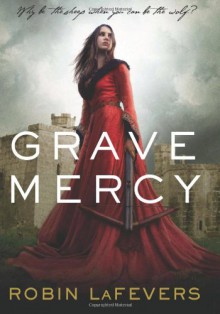
Overall Recommendation: I actually don’t recommend this book because I object so strongly to the points that I did not like (see below), but neither is it a one-star book.
What is there to like?
▪ The premise, a convent of lady assassins, is pretty cool.
▪ In this alternate-historical world, national identity is tied very closely to religion, old gods are appropriated by the state religion as “saints,” and believers in the old ways are thought of as heretics. Although I believe the particular gods/saints in this story are imaginary, the overall picture of politics and Catholicism in Europe, as well as folk religion in Brittany specifically, in the Early Modern (?) period is a nice tie-in for readers interested in history—or who might become so after reading this.
▪ Several discussions about the roles available to women at the time—mother, mistress, wife—and the limitations of power, both social and political.
▪ The plot is action-y and intrigue-y.
What's not to like?
▪ I first started disliking reading this book when language problems started cropping up. Although I’m aware that a) a YA novel written entirely in Early Modern English would attract few, if any, readers, and b) the characters would probably actually be speaking French anyway, the author has clearly gone to some trouble to attempt writing both dialogue and narration (as it is in first-person) in a more period-appropriate-sounding voice. Therefore, it becomes increasingly noticeable and grating when characters use anachronistic language such as plus, neutralize, quit in the imperative (as in “Quit intimidating my novice…”), and fine meaning “ordinary.”
▪ Although the depiction of girls being married off as young as 13 is historically accurate, both Ismae (at the beginning) and the duchess are far too self-possessed to be believable as 13-year-olds, and I’m afraid the impact of the marriage plights of both characters is actually lessened by the fact that they seem so much older.
▪ Hints are not so much dropped as forcibly shoved off high-rise balconies to land with resounding thuds. None of the turning points are truly surprising.
▪ The concept of a convent of lady assassins may be cool, but I had serious objections to the way it was pounded in that in order to be an effective female assassin, the novitiates had to use sex appeal or indeed actual sex, and that men are essentially all easily-duped sex-crazed (heterosexual) fools. I feel this fits with the boom within the past decade or so in the encouragement of young women to use their sexuality as a means to get what they want from men, thus participating in their own objectification rather than demanding to be treated as equals.
▪ . . . which brings us to the final, most seriously problematic point of all. I’ll label it as a spoiler, but I don’t want to hide it because I feel so strongly about it. So: spoiler alert for the rest of this paragraph. Since Ismae was raised to believe in the precepts of her convent, she struggles with her growing feelings for her love interest—so far, so normal for YA romance. But her actual decision to have sex with her love interest is motivated not by her own desire, but because having sex with him will save his life. Are. You. Kidding me. Like, seriously. Is this real. Sure, there’s attraction between the characters. Sure, she is the one who makes the decision. But Ismae has many opportunities to act for her own desires of her own will, and she never does so until the point at which she realizes that her magical poison-immunity powers can somehow be transferred to her lover by having sex with him and thus save him from death. Her final decision is all about him, not her. Which, given the whole context of the otherwise basically feminist book, is infuriating. I would have thrown the book across the room in disgust, but it was a library copy and also I was on a plane.
Similar To:
Throne of Glass (Throne of Glass, #1), Sarah J. Maas—lady assassin gets picked up by a dashing courtier for a mission of court politics, romance ensues
Shadow and Bone (The Grisha, #1), Leigh Bardugo—former lower-class magical warrior-type gets picked up by the court powers; also there is a heroine-gets-fitted-for-a-pretty-dress-and-is-transformed scene—are these mandatory in YA these days?
Seraphina (Seraphina, #1), Rachel Hartman—royal bastard love interest, plotline of a princess being manipulated for political gain
What made me pick it up?
I read a positive review of the second book in the series (Dark Triumph), which is new this season, and was interested enough that I wanted to read this first one.

 Log in with Facebook
Log in with Facebook 









